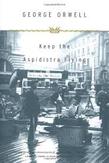 Introduction The fifth selection of Half Half Man’s Book Club was George Orwell’s Keep the Aspidistra Flying. I must admit it was quite a downer -- up until the last pages. I kept feeling angry and disappointed by the main character, Gordon Comstock, who is clearly talented but lets his talents go to waste because of absurd principles he stubbornly holds on to. In the end it is love (by accident) that forces him to wake up and find a way to make his life meaningful, and we can learn a lot from his sad story and apply it to our own artistic endeavors which often seem no less difficult than Gordon’s. Dedication to art and quality It’s immediately apparent to the reader that Gordon is talented and has a keen eye and ear for words and a deep love of books. He hates the idea of “jobs” and the only job that’s not completely offensive is working in a bookstore. For him, there is a clear delineation between books that are crap and books that are gold. When he comes home at night, penniless and hungry, his only consolation is rereading his favorite books. And when he sees advertisements or prose that’s poorly written, it incites in him a visceral anger. He is not just a “fan” of the English language used right; it is his life. And it is in the same way that he knows his body that he knows his art and written creations. Reading these things about Gordon reminded me of my favorite magicians and their dedication to their art and to quality. As I have tried to grow as a student myself, my appreciation has deepened for the immense amount of time and effort that professionals put into each element of their routines, each word, gesture, and move being an artistic and thoughtful choice. Real artists strive -- in fact, are ready to suffer -- for quality in the same way, no matter the art form. Principled or stubborn? Gordon’s love of poetry and art is his strength, but it is also the cause of his downfall. He turns his love of art into a hate for money (which is further reinforced by his poverty). In his mind, he can’t reconcile how life and society can be good while also being linked to money. For him, the most despicable idea is that of a “real job.” He struggles to figure out how to live by writing poetry and making art, and he fails to take advantage of opportunities that come his way even when he gets lucky breaks. As a result, he lets his skills and art go to waste out of pure stubbornness. This is a pretty sad and extreme counterexample to how an artist should be. There is certainly virtue in dedicating yourself to a principled existence and to giving 100% of your time and energy to a single cause, but the principles Gordon chose were counterproductive, and he never really dedicated himself in a professional way to his own art. Gordon’s is certainly a cautionary tale for any magician considering going full-time or struggling with a job in general. No matter what you apply yourself to -- magic or otherwise -- you always need to do your best, be productive, and focus on reality and principles that will lead to a rational, happy life. Professionalism and creativity This book certainly gets across the fact that creativity in art is hard work. But that’s not something that Gordon really knew how to do well. It’s clear how he struggled to write and create poetry, but it’s also clear how he lost the battle to procrastination, wasted time, and writer’s block. In the rare times he actually showed his work to others, he either squandered whatever success he found or let himself get completely hammered by rejection and self-doubt. He was not one to take feedback constructively. Gordon’s story is a warning to anyone who loves his or her art but struggles to do it professionally. Luckily, there is a better example and process, described eloquently by Steven Pressfield in his book, The War of Art (1). Pressfield does an excellent job effectively describing Gordon and his maladies in the concept which he coins “resistance.” It’s anything that gets in the way of sitting your butt down to write or create, to do the annoying, frustrating, and difficult work that needs to be done. Pressfield offers the concept of “turning pro” in the abstract sense as the solution: adopting the habits of a professional in your approach to art. This means having a morning routine, which many of the most successful artists do (2), showing up every day to your art like it’s your job, and forcing yourself through habit and explicit rules to get work done at all cost, even if it’s minimal or initially crappy. Conclusion The fifth selection of Half Half Man’s Book Club was a sad but important lesson in the struggle to create art in a practical real world. In the end, it is love that forces Gordon to use his talents and create art through his job. It is sad that he chose to give up on his poetry to do that, but as a professional, he will be able to create and produce words that impact people’s lives positively, and maybe one day he can return to the poetry that got him started. If he had approached his art like a professional from the beginning, it’s possible his life may have turned out quite differently. References 1. Steven Pressfield. The War of Art: Break Through the Blocks and Win Your Inner Creative Battles. 2002.
0 Comments
Your comment will be posted after it is approved.
Leave a Reply. |
Archives
June 2024
Categories
All
Subscribe |
 RSS Feed
RSS Feed
